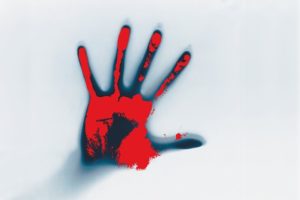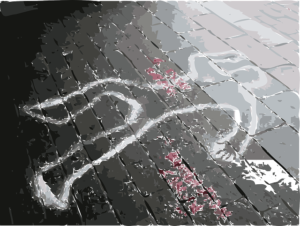 Debbie and I were surfing the same wavelength this week. If you didn’t get a chance to read her post, be sure to check it out.
Debbie and I were surfing the same wavelength this week. If you didn’t get a chance to read her post, be sure to check it out.
As technology has become more integral to daily life, authorities have increasingly sought evidence from mobile phones, laptops, social media, and even a video game.
Last summer, I heard about a murder case in Arkansas. The high-profile defense attorney, Kathleen Zellner — best known as Steven Avery’s attorney in season two of Making a Murderer — petitioned the court for Amazon Echo recordings.
The Amazon Echo entered the November 2015 murder case after Victor Collins (47), a former Georgia police officer, died in the suspect’s hot tub. An observer told police he’d heard music streaming through the device that evening.
Zellner’s client, James Bates, invited two friends to his Bentonville home to watch college football, drink beer and shots of vodka. After the game, the three men slipped into Bates’ hot tub. Around 1 a.m., Bates said he went to bed. When he woke in the morning, Collins was floating face-down in the hot tub.
The defense contended the death was a tragic accident, stemming from high levels of alcohol. At the time of death, Collins’ blood-alcohol content was at .32, four times the legal limit to drive in Arkansas.
Investigators believed Collins’ body showed evidence of strangulation prior to drowning. Signs of a struggle they’d seen in the house, including a broken shot glass, dried blood on the floor, injuries to both Collins and Bates, and indications that someone hosed down the patio and hot tub before police arrived. They further contended Bates’ water heater, another smart device, recorded an exorbitant amount of water used in the early morning hours, in what investigators believed was an attempt to conceal the crime. The defense argued the same amount of water had been used 12 hours prior to the night in question.
After Amazon released the recordings, the prosecution dropped all charges against Bates. Why? The DA stated, “They cannot meet the legal requirements to proceed.” No further mention of the Echo recordings, but writers don’t need the outcome to envision the story Alexa might tell.
See where I’m going with this? We could spin the recordings anyway we want. Keep that in mind while you read this next case.

Fast-forward to January 27, 2018, when Amazon Echo recordings could solve a brutal double homicide.
In my home state of New Hampshire — a 30-40 minute drive from where I live — two slayings rocked the quaint Farmington community. In the early morning hours of January 29th, Dean Smoronk returned home after a trip to Florida. When he arrived, his live-in girlfriend, Christine Sullivan, and a friend, Jenna Pellegrini, who was staying with the couple at the time, were both missing. He called 911 around 3 a.m., and said he thought there’d been a murder.
When officers arrived at the scene, Smoronk pointed out a large blood stain on the mattress in the upstairs bedroom and dried blood in the kitchen, with a blood smear on the refrigerator. Hours later, New Hampshire State Police found the two women cocooned in tarps, stuffed under the porch. Eight stab wounds littered Sullivan’s body, her skull fractured by a blunt object. Pellegrini’s head, face, and chest showed 48 stab wounds.
During the search, investigators also found several knives wrapped in a flannel shirt — the same flannel shirt worn by Timothy Verrill, caught on the home’s surveillance footage that night. Verrill was a known drug dealer in the area. At the time of the killings, he was friends with Sullivan and Smoronk. Some speculate he was also Pellegrini’s boyfriend, but there’s some conflicting evidence on whether that’s true. Allegedly, Verrill feared the two women were working with authorities on an undercover sting, of which he was the intended target.
State Police seized an Amazon Echo from the crime scene. Had Alexa recorded the murders and subsequent cover-up?
On Oct. 30th, Senior Assistant Attorney General Geoffrey Ward asked the judge to direct Amazon.com to produce any recordings made between Jan. 27 and Jan. 29, 2017, suggesting evidence of the murder and/or hindering prosecution could be found on the device.
In the motion, made in lieu of an application for a search warrant, Ward wrote, “As part of the normal functioning of an Echo electronic device, activated either intentionally or accidentally by ‘wake up words,’ audio recordings are made from the moment when the device is activated. Specifically, when the Echo detects a ‘wake up word(s),’ the device begins audio recording through its integrated microphones, including recording the fraction of a second of audio before the ‘wake up word(s).’”
Wake up words include Amazon and Alexa, but as Debbie pointed out, Alexa records even when those words aren’t mentioned.
Ward’s motion also asked for a wider scope in order to identify cellular devices that paired with the smart speaker within the same time period.
The judge ordered Amazon to hand over the recordings. No word yet on what Alexa overheard that night. The trial begins in May, 2019.
So, TKZers, if you were writing these stories, what would you reveal in the recordings? Get your creative juices pumping by including a jaw-dropping twist!
WINGS OF MAYHEM is on sale for 99c.
“The story spins ahead with escalating velocity and well-rendered literary layers, always leaving the reader pleading for more information while delivering just enough with exquisite timing, always nailing a clear and rationale dissection of what seemed in the moment like insanity or illogic. The craft of the writer is on display from page one, with intense pacing, deeply drawn characters and a matrix of plot elements that never lets you see the big picture as completely as you think you do, thus setting up an ending that demands you stick with it until the final, unexpected twist.” ~ USA Today Bestselling Author Larry Brooks

